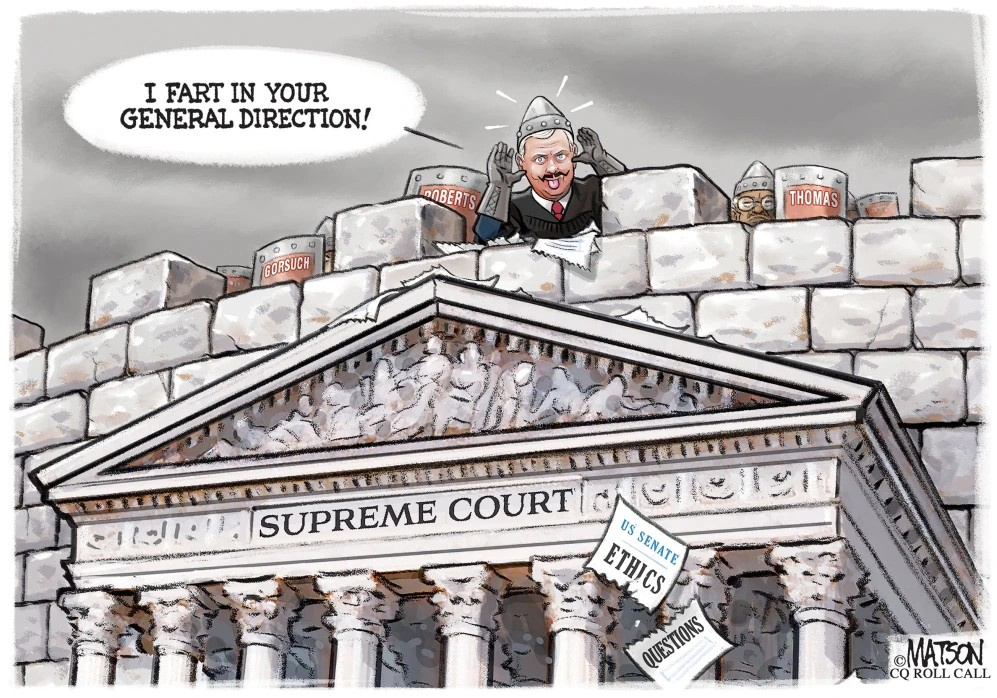Post by LFC on Feb 9, 2023 15:49:10 GMT
North Carolina Republicans are looking to SCOTUS to allow them to throw out their own state constitution in order to lock in their political power. Right-wing partisan hack SCOTUS is likely to twist themselves into a pretzel and provide the outcome they already know they want.
A recent decision by the North Carolina Supreme Court suddenly put one of the U.S. Supreme Court’s biggest cases of this term on shaky ground.
The state court, with its brand new Republican majority, announced that it would rehear the redistricting dispute at the heart of Moore v. Harper, an election law case that experts have warned could reshape how American democracy functions. North Carolina’s old, Democratic-majority bench had tossed out gerrymandered maps produced by the state’s Republican legislature just one year ago, and the Supreme Court had heard oral arguments on the case in December 2022.
In response to the state Supreme Court majority’s decision to rehear the case, the two Democratic justices left on the bench penned a blistering response, calling the move a “power grab” and a “radical break with 205 years of history.”
A new decision by the state court may render moot the case the Supreme Court is currently mulling.
North Carolina legislators had asked the state court to rehear the case, prompting court watchers to ask: Why would these Republicans risk removing the case from the Supreme Court’s hands after they’d managed to get the independent state legislature theory before such a favorable bench?
The theory, in its maximal form, empowers state legislatures to control voting laws, election procedures and redistricting to the exclusion of all other state-level entities, including courts, constitutions and even gubernatorial vetoes.
Some surmised that the legislators were predominantly acting out of self interest: perhaps they’re content to take the favorable district maps, and can leave reshaping how American democracy works for another day.
“The state legislators recognized that the state Supreme Court is likely to do exactly what they want,” Doug Spencer, an associate professor at the University of Colorado Law School, told TPM. “They don’t have grand hopes for the independent state legislature theory, they just want their maps passed.”
“Gerrymandering the legislature itself is probably a bigger motivation for them than the independent state legislature theory,” added Carolyn Shapiro, law professor and founder of Chicago-Kent’s Institute on the Supreme Court of the United States.
The state court, with its brand new Republican majority, announced that it would rehear the redistricting dispute at the heart of Moore v. Harper, an election law case that experts have warned could reshape how American democracy functions. North Carolina’s old, Democratic-majority bench had tossed out gerrymandered maps produced by the state’s Republican legislature just one year ago, and the Supreme Court had heard oral arguments on the case in December 2022.
In response to the state Supreme Court majority’s decision to rehear the case, the two Democratic justices left on the bench penned a blistering response, calling the move a “power grab” and a “radical break with 205 years of history.”
A new decision by the state court may render moot the case the Supreme Court is currently mulling.
North Carolina legislators had asked the state court to rehear the case, prompting court watchers to ask: Why would these Republicans risk removing the case from the Supreme Court’s hands after they’d managed to get the independent state legislature theory before such a favorable bench?
The theory, in its maximal form, empowers state legislatures to control voting laws, election procedures and redistricting to the exclusion of all other state-level entities, including courts, constitutions and even gubernatorial vetoes.
Some surmised that the legislators were predominantly acting out of self interest: perhaps they’re content to take the favorable district maps, and can leave reshaping how American democracy works for another day.
“The state legislators recognized that the state Supreme Court is likely to do exactly what they want,” Doug Spencer, an associate professor at the University of Colorado Law School, told TPM. “They don’t have grand hopes for the independent state legislature theory, they just want their maps passed.”
“Gerrymandering the legislature itself is probably a bigger motivation for them than the independent state legislature theory,” added Carolyn Shapiro, law professor and founder of Chicago-Kent’s Institute on the Supreme Court of the United States.






